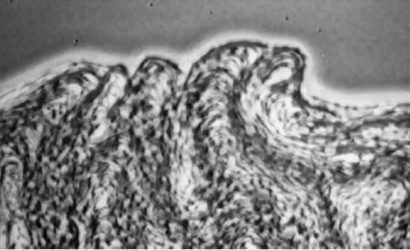PolymPart: A mathematician from RUDN University has proven that there are no solutions to functional differential inequalities associated with the Kardar-Parisi-Zhang (KPZ)-type equations, nonlinear stochastic partial differential equations that arise when describing surface growth. The obtained conditions for the absence of solutions will help in studies of polymer growth, the theory of neural networks, and chemical reactions. The article was published in Complex Variables and Elliptic Equations.
 Method to simplify polymer growth modelling
Method to simplify polymer growth modelling
The main difficulty with nonlinear partial differential equations is that many of them are not solved exactly. For practical purposes, such equations are solved numerically, and the questions of the existence and uniqueness of their solutions become problems over which scientists have been struggling for decades, and sometimes centuries. One of these problems—Navier-Stokes existence and smoothness—was included in the famous list of Millennium Prize problems: The Clay Mathematical Institute in the U.S. offers a prize of $1 million for solving any of these problems.
Any partial differential equation is defined in a certain area, e.g., on a plane or in a sphere, or in space. Usually, it is possible to find a solution to such equations in a small neighborhood of a point, i.e., a local solution. But it may remain unclear whether there is a global solution for the entire area and how to find it.
Another problem of nonlinear partial differential equations is that their solutions can “blow up,” that is, suddenly begin to tend to infinity on finite time intervals. If this happens, it means that there is no general solution. And vice versa, if a general solution does not exist, it means that any local solution found must also “blow up” somewhere. Therefore, it is important to look for conditions under which there is no general solution.
Mathematicians use differential inequalities in their attempts to deal with this problem. The essence of the method is that it is possible to get nonstrict inequalities that will be “stronger” than the original equation from the original partial differential equation. Then, if a function does not satisfy these inequalities, it is definitely not a general solution to the original equation.
RUDN University Mathematical Institute mathematician Andrei Muravnik used the method of inequalities. He generalized the existing theorems to the quasilinear case that arises in the study of the KPZ-type equations. The conditions obtained not only limit the set of possible solutions to the KPZ-type equations, but are also are necessary for the solvability of problems that arise in practice. In particular, these results help in solving the problems of surface growth when modeling the behavior of polymers, and can also be used in the theory of neural networks.
The inequality method theoretically predicts the discontinuous behavior of physical systems described by the KPZ-type equations. This will make it possible to draw conclusions about the physical properties of these systems. Also, this method can help with the problems of extendibility of local solutions. Such methods become necessary when computational methods are no longer enough. Similar problems arise in the theory of traffic flows, chemical reactions with diffusion, as well as in the modeling of phase transitions.
In recent years, the theory that there are no general solutions to nonlinear problems has been developed farther. An article by Andrei Muravnik continues this trend. The conditions for the nonexistence of solutions are interesting not only from a theoretical point of view, but also because they will help scientists in studying a multitude of applied problems. In the near future, the RUDN University mathematics’ results can find many applications in applied mathematical physics.
Source: https://phys.org/news/2019-11-mathematician-method-polymer-growth.html
